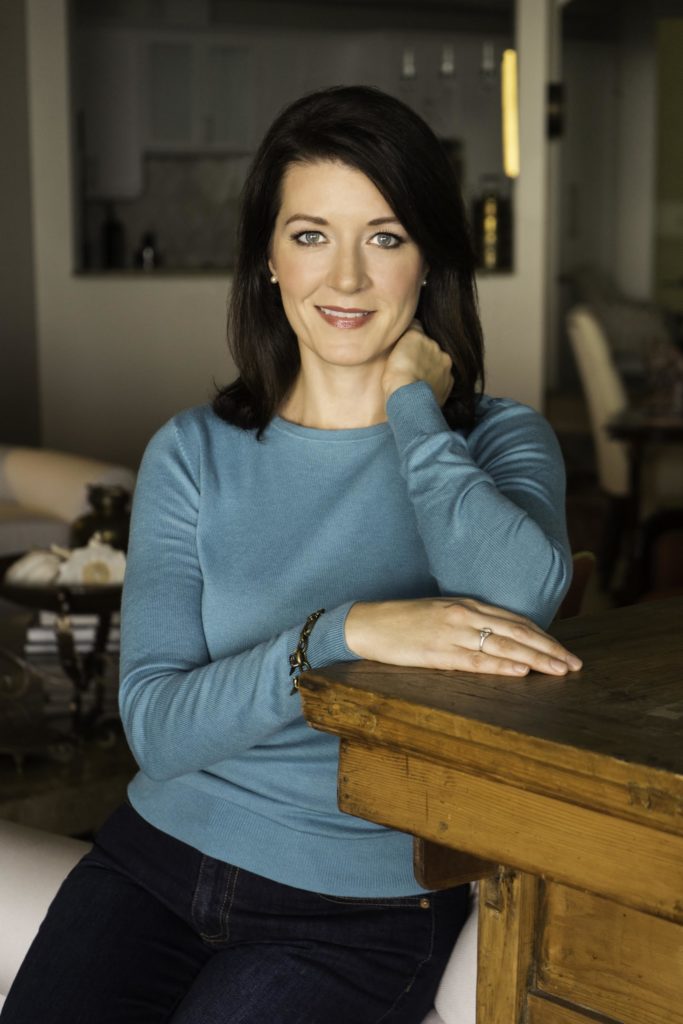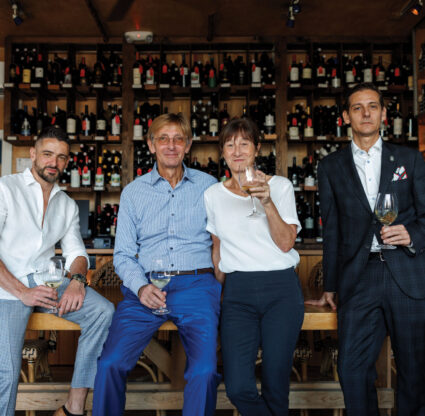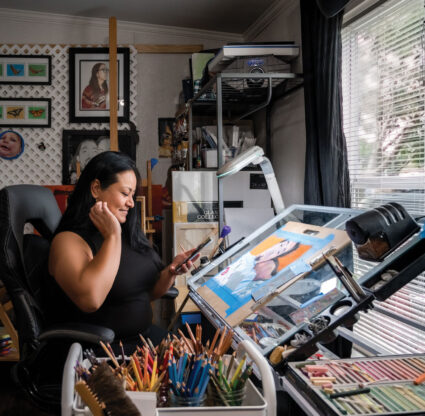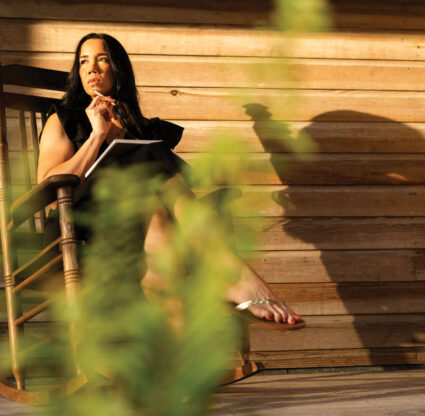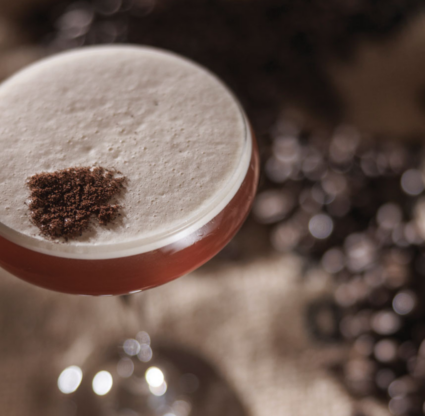Marco Island resident and author Ann Kidd Taylor recently celebrated the release of her first solo novel, the Southwest Florida-set The Shark Club, with an appropriate first stop on her book tour: the Barnes & Noble at Naples’ Waterside Shops.
Taylor—daughter of the proclaimed author of The Secret Life of Bees, Sue Monk Kidd—first moved to Southwest Florida when her son was just 6 years old. Together, they immersed themselves in the lush environment, explored and researched the area marine life. Taylor was captivated.
Then, she discovered the illegal issue of sharking finning: the merciless act of cutting off sharks’ fins and throwing the de-finned sharks back into the ocean to die. According to the Humane Society International, shark finning can disrupt the food chain. If sharks disappear, other sea life will ultimately suffer. Taylor was heartbroken.
In its most honest form, The Shark Club is Taylor’s call for action to end shark finning. She informs readers of its impact through the fictional story of 30-year-old marine biologist Maeve.
Read on for some surprising details of Taylor's personal journey, some unknown attributes of Maeve—and why Taylor thinks the word to perfectly describe her book is “alive.”
 Gulfshore Life: You told us about hitting a crossroad in your life when you got your rejection letter from grad school. Can you share how you transitioned from wanting to be a history teacher into wanting to be a writer?
Gulfshore Life: You told us about hitting a crossroad in your life when you got your rejection letter from grad school. Can you share how you transitioned from wanting to be a history teacher into wanting to be a writer?
Ann Kidd Taylor: I definitely chronicle this in (the novel I wrote with my mother) Traveling with Pomegranates. That book is really looking at the thresholds that are so common in young women and older women. I was fresh out of college and my mom was turning 50.
My mom and I were traveling a lot, and I was really inspired by a lot of the feminine figures … Our travels felt very purposeful and intentional.
I think to ask the questions of “What do I want to do with my life?” and “Do I have the courage to do it?”—these were the kinds of things that we were really thinking about.
I did kind of naturally gravitate toward writing because it was all I ever wanted to do. … That felt right to me. … I think I did run away from it a little bit, because I thought, “My path has to be different from my mom’s,” because that just made sense, right? … I think we have to do those things on our own and maybe it would have gone differently if she had piped up and told me, so it turned out to be that necessary fire for me. I found the light again.
GL: What are some of the benefits of having a history background now that you’re a writer?
AKT: It’s funny, when I was visiting Marco Island I wanted to read about its history. … I think when it comes to writing fiction, part of the research for those creative threads that you follow (is researching history). … If I have a sense that my character is from a particular city or country, I might explore that whole culture to learn about her.
GL: Can you give us some of those unknown details about Maeve that didn’t make it into the novel?
AKT: She likes a lot of ketchup with her fries. … She had a dog named Pele, and everybody would go, “The soccer player?” and she’d say, “No, the goddess.” Things like that, just little quirky things.
GL: What were some of the challenges in creating Maeve, or her ex-fiance Daniel, or her brother Robin, for the book?
AKT: I do not share Maeve’s scientific background; I would be quite hesitant getting in the water with sharks, even knowing what I know about sharks, (that) they’re not going to bite you simply because you are in the water. She certainly has a bravery about (sharks) that I don’t. There was a lot I had to learn about her field and about sharks. … Otherwise, her voice felt very fluid and very natural to me. … I think it mostly had to do with the research surrounding their fields; once those three kind of got together, that felt a little more fluid.
GL: What did you learn from the characters you created?
AKT: I think probably (the character) Hazel teaches me to not lose that kind of love and enthusiasm about our world, that it would be a shame to lose that kind of excitement for whatever it is that brings you joy. … That if you find something that brings you joy, just seize upon it with your whole heart, that that’s worth doing.
(And), you know, Maeve had to truly follow her own thread, even when that felt a little scary. And sometimes the scariest thing is to just be yourself; I think that she inspires me to do that a little bit.
GL: What can you tell other people who aspire to be writers but haven’t yet found their paths?
AKT: A preconceived idea about what a writer’s life might look like is probably something you’ve seen on TV, and that was true for me, I think. We form these ideas about the images that people show us, and we think that we have to fit into that to be a writer, that “I need to write X amount of pages every day.”
I think that we have to be willing to fine-tune it for ourselves and create the kind of world and space and rituals in our writing and in our creativity that work uniquely for us. … It took me a long time to write this novel because my son was younger and he was going on field trips and we were moving, and life just becomes … you know how it gets. I was in a fortunate position where I could create (that space) for myself. But I think if some people are writing part-time and working full-time at another job, again I would say just to simply dive in and simply put your toe in it, just to swim around in your creativity. To be with that is enough; that’s a great beginning.
GL: Is The Shark Club your own form of activism?
AKT: Absolutely. It’s ocean conservation, shark finning, protecting our oceans, protecting our planet and safeguarding it. These things are important, and these things matter, and they’re very close to my heart.
I still sometimes marvel that that is what I landed on, but (it’s) in the same way that Maeve, as a young woman, is exploring her unlived life and exploring her work, her desires, her yearnings and her career, her freedoms and all the questions about that. … I would say that is a theme that would turn up repeatedly in my work; women and the question of freedom, always.
It’s funny, I mention (oceanographer) Sylvia Earle in my (book signings), and one of the things she talked about in this interview. And at the end of this talk, she wished that everyone, no matter your field, whether you make films or are a school teacher or a librarian or whatever, (would help) to develop hope spots [places that have the potential to be restored to their original and natural state] in the ocean.
It wouldn’t be true to say that the whole novel was to try and answer that wish, but in some small way I think it was my effort. It’s always good when people use their voices for what really matters to them.
GL: If you had to describe the book in one word, what would it be?
AKT: Oh, that’s so hard. … “Alive”? It’s alive. The oceans, Maeve, Hazel—there’s just a lot of life in it.

